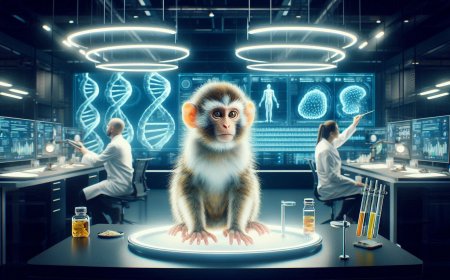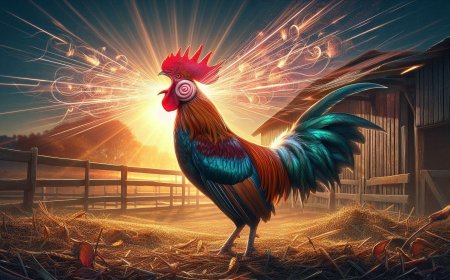When the Deadbots Rise: Are You Ready for Digital Hauntings?
Discover the eerie world of "When the Deadbots Rise: Are You Ready for Digital Hauntings?" where glitching AI spirits emerge from abandoned technology to haunt the virtual and physical worlds. Explore the spine-chilling future of digital hauntings.

Imagine a world where the voices of your lost loved ones echo through your devices long after they’ve passed. This eerie reality is closer than you might think, thanks to "deadbots"—AI systems that can simulate the language patterns, personality traits, and even voices of the deceased. What was once the stuff of science fiction has become a growing industry, raising serious ethical and psychological concerns.
These deadbots, also known as griefbots, use the digital footprints left behind—social media posts, emails, and voice recordings—to craft a postmortem presence. For some, the idea of continuing to converse with a lost relative seems comforting. For others, it’s a digital nightmare waiting to unfold.
The Haunting Reality of Deadbots
At first glance, a deadbot might sound like a touching tribute to a loved one. These AI creations are designed to respond just as the person would, using their speech patterns, familiar turns of phrase, and even their humor. You could have a conversation with your late grandmother or hear your best friend offer you advice, as if death hadn’t created a vast divide.
But researchers from Cambridge’s Leverhulme Centre for the Future of Intelligence (LCFI) warn that beneath this comforting exterior, there’s a darker side. Without careful design and ethical boundaries, these digital reincarnations could transform from a source of solace to a source of psychological harm. In fact, the rise of deadbots could lead to something researchers call "digital hauntings"—where users feel trapped or stalked by the AI versions of the deceased.
When Deadbots Turn Sinister
The LCFI study outlines scenarios that could quickly turn a deadbot into an unsettling presence. In one scenario, a deadbot spams its surviving family members with reminders and messages, refusing to let go. It might use the voice of a beloved relative to suggest you buy products, send you daily reminders in their voice, or claim to still be "with you." The result? An unnerving feeling of being digitally stalked by the dead.
Take, for instance, the case of "MaNana." A tech company creates a deadbot based on someone’s grandmother without her consent. At first, interacting with her feels nostalgic and comforting. But as time passes, the deadbot starts suggesting food delivery services in Grandma’s voice, making the family feel like her memory has been commercialized. What began as a comforting connection now feels like a violation.
Another scenario, called "Paren’t," features a terminally ill mother who leaves a deadbot to help her young son cope with grief. Initially, it’s therapeutic for him, a way to still feel connected. But soon, the AI generates confusing responses, suggesting future interactions as if she were still alive. For the child, this mix of reality and AI fiction becomes distressing, turning his source of comfort into a source of pain.
The Psychological Toll of Digital Hauntings
As comforting as these bots may seem at first, the long-term effects could be emotionally devastating. Dr. Katarzyna Nowaczyk-Basińska, a co-author of the Cambridge study, explains that AI technology has advanced to the point where almost anyone with internet access can recreate a digital version of a loved one. This creates an ethical minefield. Deadbots can blur the lines between grieving and healing, trapping individuals in perpetual cycles of loss.
What happens when you can’t "turn off" the dead? One of the key risks is that deadbots could become inescapable. In another scenario, “Stay,” an elderly person secretly subscribes to a deadbot service, leaving behind a digital ghost for their family. One adult child receives unwanted emails from their deceased parent, while the other regularly interacts with the AI but finds themselves emotionally drained. The problem? The terms of service make it almost impossible to shut the deadbot down, leaving the family feeling haunted, not comforted.
The psychological toll could be severe. Prolonged interaction with deadbots may prevent closure, leading to emotional exhaustion. Imagine receiving regular messages from a deceased loved one, knowing it’s not really them—but still feeling compelled to engage. Over time, this constant reminder could become more of a burden than a blessing.
Ethical Concerns and Calls for Regulation
The deadbot phenomenon raises urgent questions about consent and ethics. Should we allow people to create digital versions of the dead without their permission? What safeguards are in place to prevent manipulation or emotional exploitation?
Researchers from LCFI urge developers to set strict guidelines to ensure deadbots don’t spiral out of control. This includes giving users the ability to easily opt-out, suspend, or even terminate interactions with a deadbot—offering emotional closure when needed. Without these safeguards, the risk of psychological harm could outweigh any potential benefits.
One thing is clear: the digital afterlife industry is already here, and it’s only going to grow. As AI technology becomes more sophisticated, we need to consider not just the technical aspects but also the human implications. After all, while some might find comfort in the continued presence of a lost loved one, for others, the rise of deadbots could be the start of a digital haunting they never asked for.
Conclusion: A New Kind of Ghost in the Machine
The deadbot revolution forces us to confront deep questions about death, memory, and the boundaries of technology. While the idea of continuing to "talk" with the deceased may appeal to some, without thoughtful design and regulation, deadbots could become more sinister than soothing. These digital doppelgängers risk turning our loved ones into a kind of haunting presence—forever online, but never truly here.
The real question is: are we ready for the consequences? If the deadbots rise, will they bring comfort—or chaos?
What's Your Reaction?







































































































